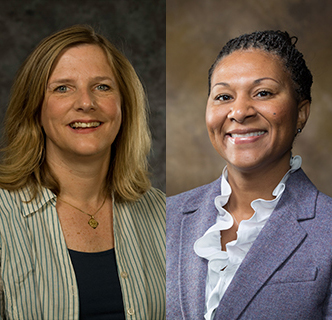FAYETTEVILLE, Ark. – University of Arkansas faculty members Lynn Koch and Stephanie Lusk are taking the lead nationally in educating other educators and vocational rehabilitation counselors about psychiatric disabilities. The two, with Chandra Carey, associate professor at the University of North Texas, edited a special issue on the topic for Rehabilitation, Research, Policy, and Education, the journal of the National Council on Rehabilitation Education.
Koch, a professor, and Lusk, an assistant professor, both of rehabilitation education and research, are members of the Psychiatric Rehabilitation Council of the national organization, with Lusk as the current chair.
“In our field, we need more people to be educated about people with psychiatric disabilities,” Koch said. “People with psychiatric disabilities often face the greatest barriers of all people with disabilities to independent living, employment and quality of life, because of the stigma attached. These tend to be very marginalized groups.”
Depression, the most common form of mental illness, has been predicted to be the second leading cause of disability worldwide by 2020. According to the issue’s introduction, a substantial number of veterans are returning from their tours of duty with psychiatric disabilities, the most common being post-traumatic stress disorder. And, an increasing number of youths are being diagnosed with psychiatric disabilities.
“We also need to educate people about the intersection of substance use disorders and psychiatric disabilities, the interplay between the two,” Lusk said. “One can increase the likelihood of developing the other, and one can exacerbate the other.”
The issue includes an article written by Lusk, Koch and doctoral student Teresia Paul on co-occurring substance use disorders, which are very common with psychiatric disabilities. Lusk explained that women and men often differ in that women tend to experience general psychiatric disabilities such as depression and anxiety first and then use drugs to alleviate their symptoms. Men, in contrast, develop substance use disorders first, followed by psychiatric disabilities.
“Very few treatment programs have expertise to treat both types of disorders in the same location, which is a barrier to access,” Koch said.
Rehabilitation counselors often must work with policies that hamper their efforts to serve people with psychiatric disabilities and substance use disorders, Koch said. Some rehabilitation counseling agencies require clients to be substance free or stabilized on medication before they can receive services.
All of the sections of the special issue address pressing contemporary issues, and the special issue will serve as a valuable resource for educators and practitioners. Articles cover psychiatric rehabilitation of people in the corrections system, supporting health and wellness, and clubhouse settings in which members design programming.
Koch and Kate Mamiseishvili, a U of A associate professor of higher education, wrote an article on degree completion by people with psychiatric disorders compared to those with learning disorders.
“People with psychiatric disabilities are one of the largest groups of students with disabilities applying for services at post-secondary institutions now at American universities and colleges,” Koch said. “Counseling and psychological services are seeing a growing number of students with serious mental health conditions and often do not have resources to support these students. We found that, the more students are socially and academically integrated, the more likely they are to persist and earn a degree. This is an issue because of the emphasis of many postsecondary institutions on student retention.”
The special issue also includes information on innovative practices in teaching such as using distance learning to prepare more professionals in the area and in service delivery such as collaborating with clients during the session documentation process.
“All members of the Psychiatric Rehabilitation Council have a strong commitment to do what we can to improve training of students,” Koch said.
While the journal issue is aimed at educators and practitioners, at the U of A, Koch developed a psychiatric rehabilitation course as part of the nationally ranked program’s mission to improve preparation of graduates to work with people with psychiatric disabilities.
Lusk is working on two more special issues, along with Jennifer Sanchez, assistant professor at the University of Iowa, covering psychiatric rehabilitation, and Koch has co-written a book, Counseling and Emerging Disabilities: Medical, Psychological, and Vocation Aspects, with Phil Rumrill, a graduate of the U of A rehabilitation counseling program and professor at Kent State University. The book is being published by Springer Publishing Co. It is the first book to focus on nontraditional, emerging disabilities and their implications for rehabilitation practice.
About the Rehabilitation Counseling Program: The rehabilitation counseling program is ranked No. 13 in the nation in the U.S. News & World Report Best Graduate Schools. The program offers doctoral and master’s degrees.
About the University of Arkansas: The University of Arkansas provides an internationally competitive education for undergraduate and graduate students in more than 200 academic programs. The university contributes new knowledge, economic development, basic and applied research, and creative activity while also providing service to academic and professional disciplines. The Carnegie Foundation classifies the University of Arkansas among only 2 percent of universities in America that have the highest level of research activity. U.S. News & World Report ranks the University of Arkansas among its top American public research universities. Founded in 1871, the University of Arkansas comprises 10 colleges and schools and maintains a low student-to-faculty ratio that promotes personal attention and close mentoring.
Topics
Contacts
Lynn Koch, associate professor of rehabilitation education and research
College of Education and Health Professions
479-575-5824,
Stephanie Lusk, assistant professor of rehabilitation education and research
College of Education and Health Professions
479-575-4817,
